The Moscow Foreign Ministers Conference
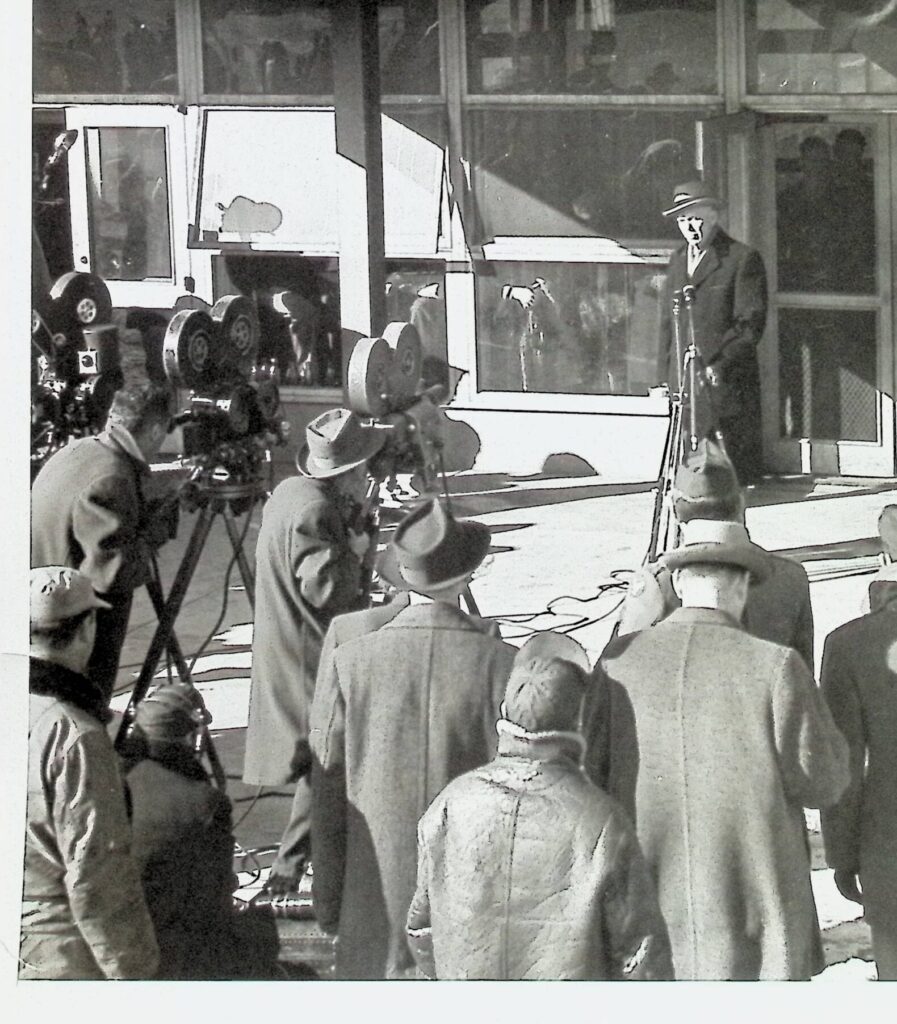
Secretary of State George C. Marshall speaks to reporters on the way to the Moscow Foreign Ministers conference.
“We fully recognize that the negotiations in Moscow will be extremely difficult and the consequences momentous. If we are successful in reaching agreements on the major fundamental principles, I would be very much pleased.”
March 5, 1947, at National Airport on leaving for Moscow
At a stopover in Paris en route to Moscow, Secretary of State George Marshall asked French Foreign Minister Georges Bidault how long he thought the conference would last. Bidault replied that the more progress made, the longer it would last. Marshall emphasized that the problems they’d be dealing with were important to the world.
The conference lasted nearly six weeks of long days. Special assistant to the Secretary, Col. Marshall Carter, explained the daily schedule in letters to his wife.
Carter met with Marshall each morning, “feeding papers and stuff into the General.” Marshall then met with advisers; after which, he “tries to take a walk, but so many NKVD people follow him he’s only done it once.” After lunch and more preparatory work, Marshall and Carter got into his car “and off we go. About 12 men in two little cars follow us around, and we go like a bat out of hell all the way to the conference building.”
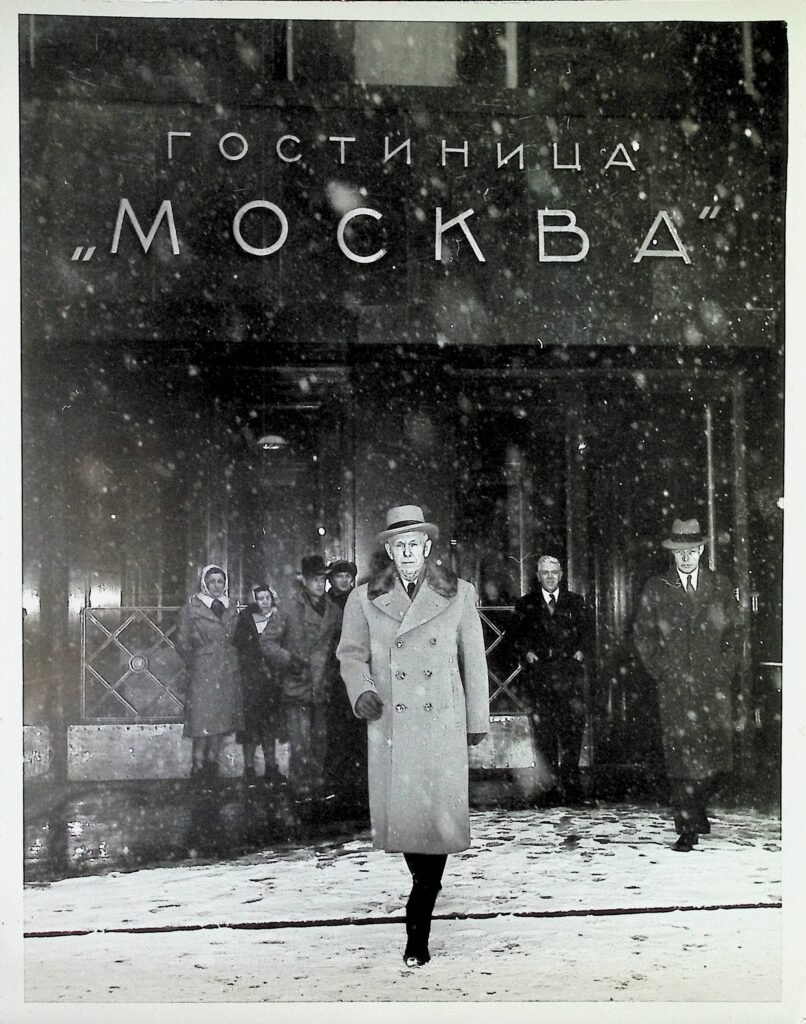
Secretary Marshall leaves the Hotel Moscow, followed by Soviet expert and interpreter Charles Bohlen.
The first of 43 recorded meetings of the fourth Council of Foreign Ministers began March 10, 1947, at 4 p.m. in the Aviation Industry House in Moscow. Meetings were held at a large round table. Each of the four ministers ( Ernest Bevin of Great Britain, Georges Bidault of France, Vyacheslav Molotov of the Soviet Union, and George Marshall) had five staff sitting at the table with them. Marshall had State Department Counselor Benjamin Cohen, Republican representative John Foster Dulles, Soviet expert and interpreter Charles Bohlen; and at various times Lucius Clay, Mark Clark, or US Ambassador to the Soviet Union Walter Bedell Smith sitting with him. Meetings ended about 8 p.m., followed by dinner and more work, making for late nights.
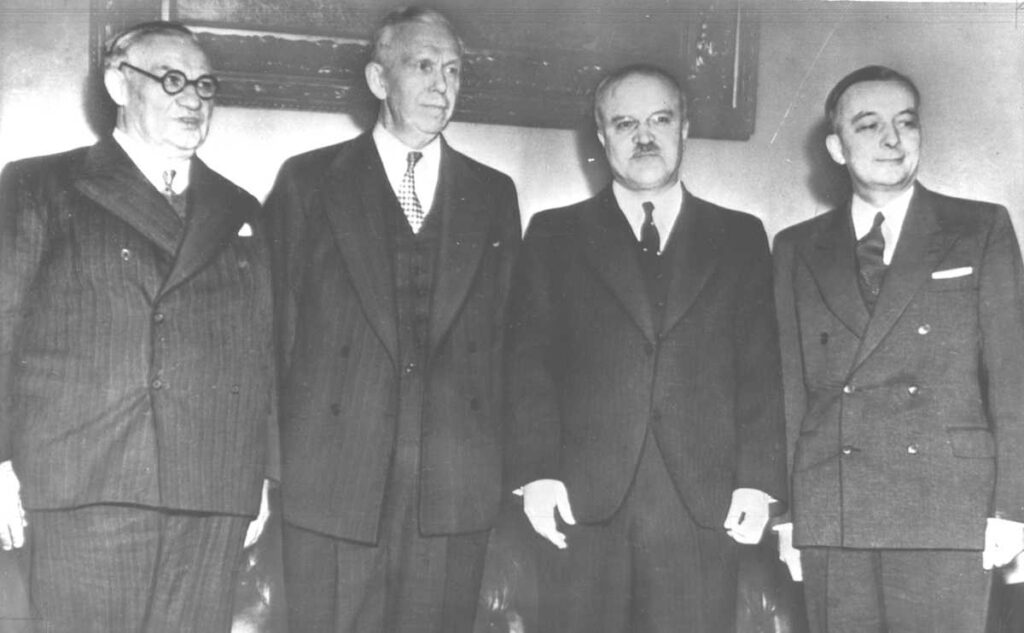
The four foreign ministers: Ernest Bevin of Great Britain, George Marshall, Vyacheslav Molotov of the Soviet Union, and Georges Bidault of France.
Carter sat at a small table behind Marshall taking notes. He made daily reports to the State Department, President Harry Truman, and selected member of Congress. Those reports indicated that progress on the questions important to the world moved very slowly.
The March 12 meeting was “relatively ineffective … propaganda for home consumption.”
On March 27 “Marshall protests that the Council of Foreign Ministers was ‘making little progress on questions which are of interest to the entire world.'” There is much discussion over which countries should be consulted in creating a peace treaty with Germany but little agreement.
In a March 31 statement Marshall indicates the fixed positions of France for German coal and the Soviet Union for industrial reparations were mutually exclusive. He noted that Soviet desire for a more balanced trade with Germany be reflected by reduced imports. In this Marshall was incensed, pointing out that food was the largest single German import and reducing that would result in mass starvation. He asked, “Does the Soviet Government make this proposal seriously?” He urged for a united Germany; “the permanent partition of Germany is dangerous to the peace of Europe.”
There was no progress on united Germany, and on April 6 still “no agreement is reached on the issue of the format of the future German state.”
On April 15, “Marshall objects to ‘the extraneous Soviet amendments [that] would totally alter the scope and purpose’ of the four-power treaty.” He charged that “the basis and origin of most of our disagreements” resulted from the Soviet Union “having clearly departed from Potsdam” agreements.
In a letter to goddaughter Rose Page Wilson on April 14, Marshall wrote of the less-serious side of the conference. “There has been very little of social trimmings to this gathering. I have gone to one dinner and reception given by Mr. Molotov. Also one evening of ballet given by him.” Marshall indicated that there were formal and less-formal dinners at the British and French embassies. Marshall hosted a dinner for the conferees, and “last night a reception and dance of the American contingent here, some 250, which broke up at one o’clock this morning.”
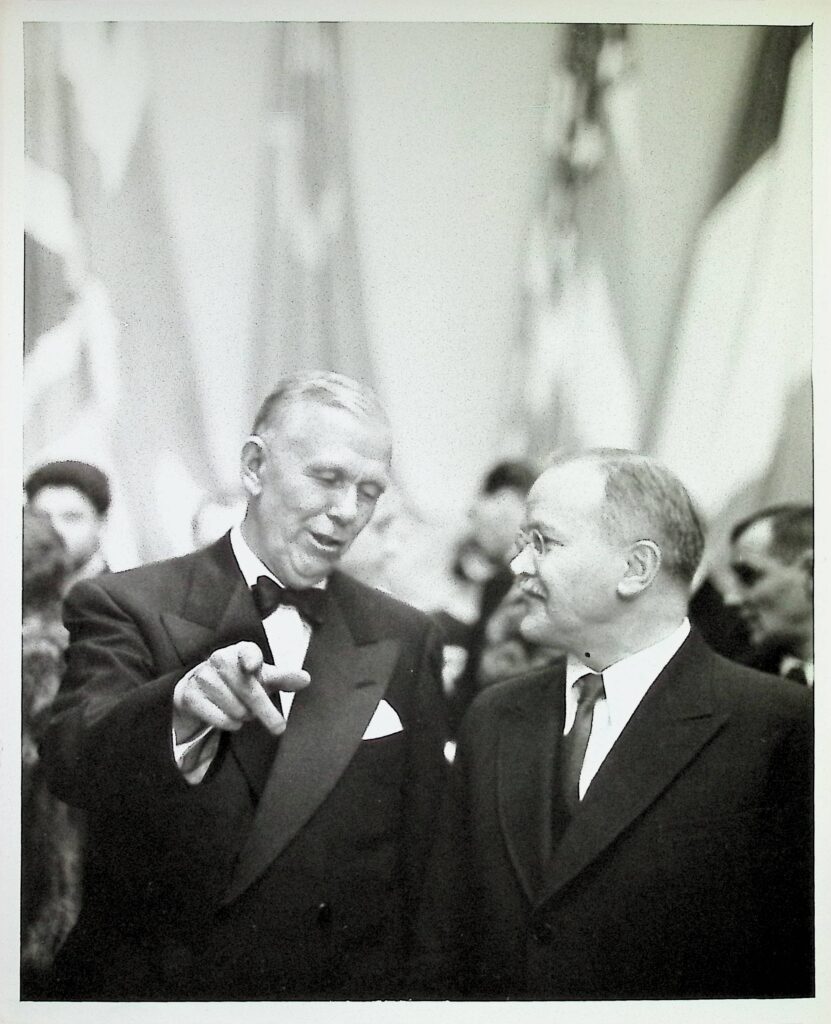
Secretary Marshall and Minister Molotov at a reception.
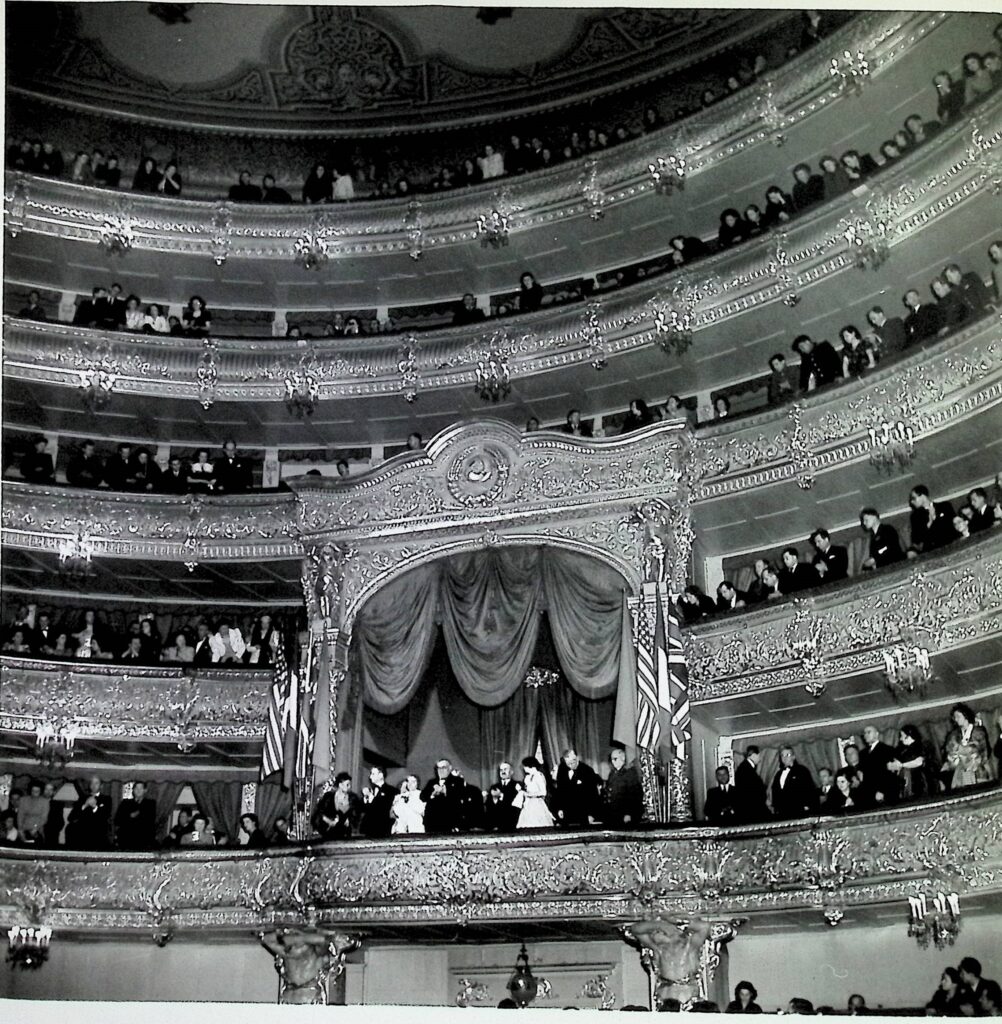
The foreign ministers at the Bolshoi Ballet and Opera Theatre.
On April 15, in a personal meeting with Generalissimo Joseph Stalin, Marshall stated that “he was very concerned and somewhat depressed at the extent and depth of misunderstandings and differences which had been revealed at this conference.”
On returning home to Washington, D.C., Marshall wrote to Henry Stimson the next day “I am sorry I brought so little bacon with me. These conferences are a very tiring business. It is a tiresome, strenuous business with spring in the air and so many thing I would like to do outdoors.”
That evening, Marshall gave a multi-network radio address to the American people, explaining what had, and had not, transpired at the conference. He said that “the recovery of Europe has been far slower than had been expected. The patient is sinking while the doctors deliberate.”
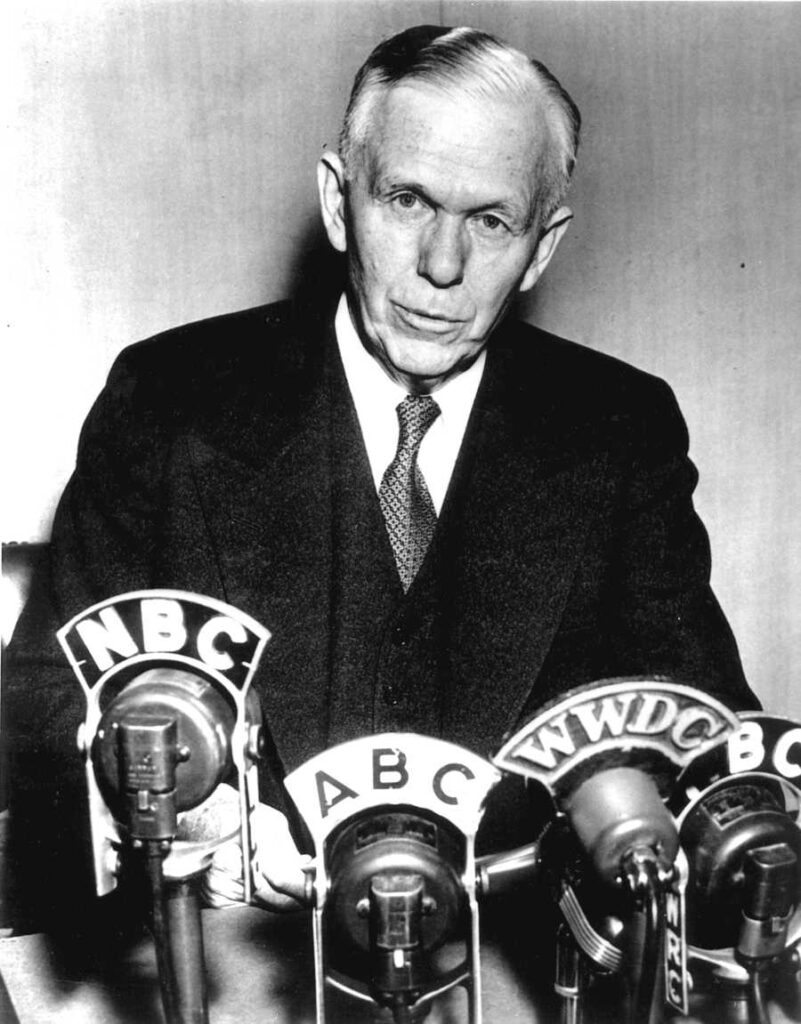
Marshall giving a radio address on his return from the Moscow Foreign Ministers conference, April 28, 1947.
In this address, Marshall was laying the groundwork for an organized plan that would help Europe recover. The plan would bear his name, help all countries alike, and become synonymous rescue and rebuilding.
Melissa has been at GCMF since fall 2019, and previously was an academic librarian specializing in history. She and her husband, John, have three grown children, and live in Rockbridge County with two large rescue dogs. Keep up with her @MelissasLibrary.
